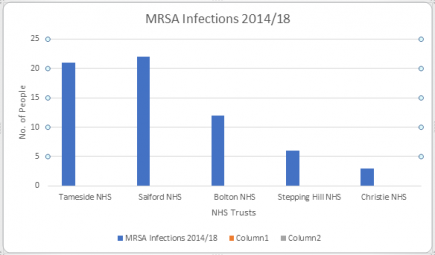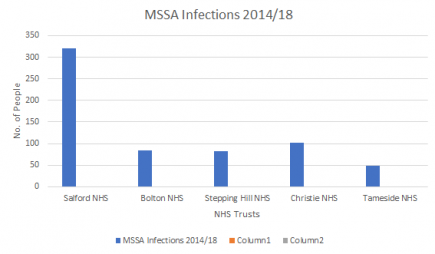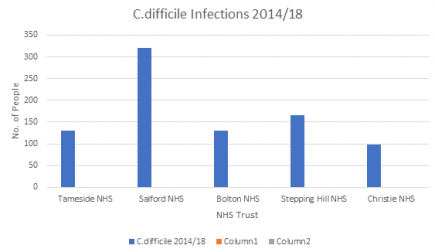Tameside General Hospital and the Salford Royal have the highest rates of MRSA infections in the Greater Manchester area, according to statistics seen by MM.
In a five-year period from 2014 to 2018, Tameside General recorded 21 MRSA cases, while Salford Royal reported a total of 22. Salford Royal has seen its infection rates treble since 2014, rising from just three cases to nine in 2018.
For the same period, The Royal Bolton reported 12 cases, Stockport’s Stepping Hill confirmed six, whilst the Christie NHS Trust had just three.
In addition, the Wrightington, Wigan and Leigh NHS Foundation Trust reported a total of only seven cases for its three hospitals, the Pennine Acute NHS Trust (PAT) recorded 44 cases across its four hospitals, while the Manchester University NHS Foundation Trust confirmed 73 cases across its nine hospitals.
Although these Trusts were asked for a breakdown of cases per hospital, they provided total numbers for all the hospitals within their Trusts.
These figures were obtained as part of a FOI request by the MM to NHS Trusts within the Greater Manchester area for the number of reported cases of MRSA, MSSA and c.difficile.

MRSA, short for Methicillin-resistant Staphylococcus aureus, is often referred to as a “superbug”, because it is resistant to several widely used antibiotics, making it much more difficult to treat and is highly contagious.
The bacterium normally infects the skin and can cause serious complications such as pneumonia, sepsis and urinary tract infections, as well as joint and bone infections after invasive surgery.
The actress Leslie Ash, who is perhaps best known for her role as Deborah in the 1990s sitcom Men Behaving Badly, caught an MRSA infection, after having an epidural injection, while receiving treatment at Chelsea and Westminster Hospital in 2004.
The infection attacked her spinal cord, leaving her temporarily paralyzed and unable to walk properly for many months afterwards.
In recent years there has been a concerted drive by Public Health England to reduce the number of infections and according to statistics published by PHE, this initiative seems to be largely succeeding.
In the period from 2012/13 to 2017/18 MRSA infection rates have declined from 9.5% to 6.6% overall within the UK.

The Salford Royal also reported the highest infection rates for MSSA for an individual hospital, with rates doubling between 2014-18. The hospital confirmed 320 cases over the five- year period, which compares with 102 for the Christie, 84 for the Royal Bolton, 82 for Stepping Hill and 49 for Tameside General.
The best performing Trust in the MSSA category was Wrightington, Wigan and Leigh, with a total number of only 60 cases across its three hospitals, while PAT recorded 605 cases across its four hospitals.
MSSA belongs to the same family as the MRSA bacterium, but crucially it is not resistant to the antibiotic methicillin, making it much easier to treat. It still has the potential to cause serious complications, such as septicaemia.

Clostridium difficile (c.difficile) is another common hospital infection. It normally infects the bowel and can cause anything from mild diarrhoea to life threatening colitis. It tends to inflict people already on antibiotics and is easily spread to others. It is, however, still treatable by antibiotics.
The highest number of infections were reported by Salford Royal with 320, Stepping Hill with 165, the Royal Bolton and Tameside General with 130 each, and the Christie with 98.
The Wrightington, Wigan and Leigh NHS Foundation Trust confirmed 95 cases across its three hospitals, PAT reported 624 across its four hospitals and the Manchester University NHS Foundation Trust recorded 978 across its nine hospitals.
Stephanie Nelson, communications manager at Salford Royal, pointed out that the infection rates for the hospital appear high because they include “all reported cases”.
In other words, they include the number of all those patients who arrived at the hospital already infected with one of the above bacteria, as well as the number of people who contracted the bacteria while in hospital. According to Public Health England, 68% of MRSA cases are contracted outside hospitals, as are 74% of MSSA cases.
Ms Nelson added: “Salford Royal is a huge, massive university teaching trust. It is like a very big organisation and comparing that to a smaller organisation is not comparable.
“We are going to see a huge number of patients compared to a smaller hospital. The more patients you see, the more likely you are going to have patients with these infections.”
She added that according to recent data “some of our (infection) rates were the lowest in the region for the last quarter.”
Jonathan Mason, senior communications officer at Tameside General, responded to MM about the high MRSA infection rates.
“The Trust was concerned with the number of MRSA bacteraemia cases in 2018-19 and NHS Improvement were contacted and asked to visit to review our processes. Some actions to support improvement in practice were offered following the visit, and the Trust was commended for actions that had already been put in place to reduce risk and improve infection prevention.
“To reduce the risk of MRSA bacteraemia, patients are screened on admission and treatment given where necessary. The Trust undertakes monthly hand hygiene and environmental audits, has hand decontamination (wash/gel) throughout the Trust for staff and visitors and there is a robust infection prevention training package in place for staff.”
Main image courtesy of Ben Taylor via Flickr, with thanks.



